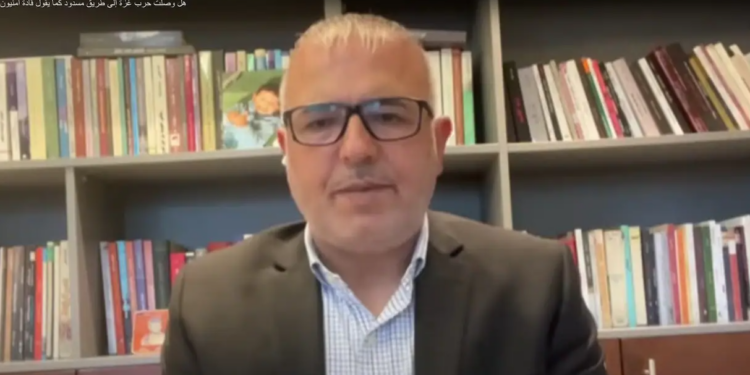A Palestinian jailed for his part in murdering an Israeli man is used as a regular contributor by the BBC’s Arabic channel without his conviction being disclosed. The Telegraph has more.
Ismat Mansour has been interviewed by BBC Arabic at least seven times in the first seven months of the war in Gaza, billed as a “Palestinian political analyst” and “Palestinian author and researcher”.
But critics say BBC Arabic has failed to point out to its audience that Mansour was sentenced to 22 years in jail following the murder of 30-year-old Haim Mizrahi and has since spoken of having “no regrets” over his role in the killing.
Mansour was among 26 Palestinian prisoners freed early from prison by the Israeli authorities in August 2013, as part of a gesture to the Palestinian Authority in peace talks brokered by the U.S.
He had been jailed at 16 after helping two older teenagers stab Mr. Mizrahi to death near the West Bank settlement of Beit El in October 1993, a month after Israel and the PLO signed the Oslo Accords. Mr. Mizrahi’s wife was pregnant at the time.
Though Mansour denied doing the stabbing himself, an Israeli judge found that he held the Israeli down during the stabbing.
Mansour said on his release from prison: “I have no regrets. I was part of the struggle of my people, I don’t reconsider my contribution.”
A year after his release, he told an Israeli interviewer: “That person [the victim] is a settler, he is on my land and it is not his place.
“I don’t feel sorry. Let’s say that today I would not have done the same, but I don’t regret what had happened, either. I did something that is good for everyone. This promotes peace.”
Worth reading in full.











To join in with the discussion please make a donation to The Daily Sceptic.
Profanity and abuse will be removed and may lead to a permanent ban.
Yes. To be fair, the garden thermometer reading during the recent hot spell (“40C”) was 94 degrees, compared to, as I remember, a previous highest of around 90 degrees over the past few decades. All irrelevant anyway, what is needed is a proper accurate cost-benefit analysis for governments trying to change the climate (and for that matter how likely they actually are in the real world to essentially leave wealth in the ground when hard times come and people are feeling the pinch).
By the way, does anyone know how much influence (if any) the solar flare at the time of the “40C” reading had (and what value readings from next to busy airfields have for that matter)?
The vast majority of models show enhanced warming over the Arctic, but closer to twice the global average. This is true regardless of whether the forcings fed into the models are natural or the supposed effect of carbon dioxide. I assume that the opposite is also true and if we are entering a period of global cooling the Arctic will cool faster than the rest of the globe meaning that any cooling trend will become obvious in Arctic temperatures before it shows up in global data sets.
Just enjoyed a very pleasant evening on our patio (ak agin palace) after a hottish day. Nothing unique as far as I can recall (born 1949).
A major work Arctic Ice was published in 1940, by the Russian oceanographer N. N. Zhubov. It reads in places like an abstract of the modern Arctic-ice alarm. Arctic temperatures in the 1920s and 1930s rose at unprecedented rates. Vast areas that once were ice-bound had become navigable. Fish species never before seen so far north were now commonly brought up in the nets of arctic fishermen. The general winter temperatures were several degrees higher than the maxima of previous decades.
Not too bad for Greenland ice sheet either despite the doom-mongering http://nsidc.org/greenland-today/